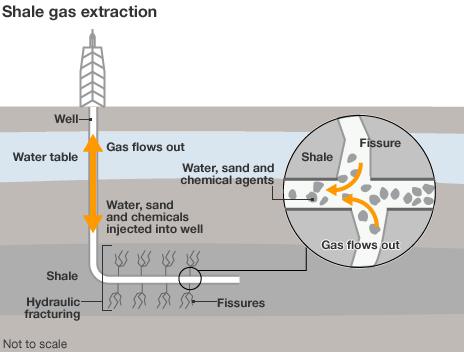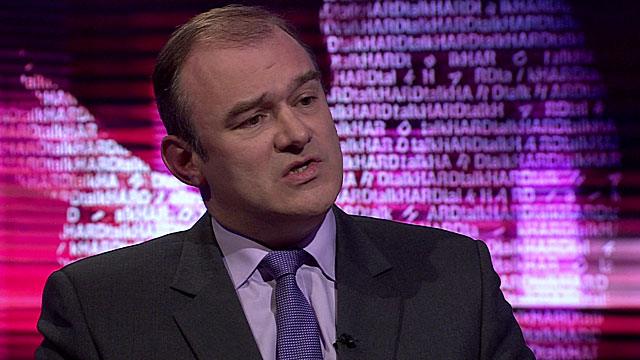Davos: Fracking to boost UK economy, David Cameron says
- Published
David Cameron urged the EU not to impose "premature regulatory burdens" on shale exploration
Shale gas extraction through fracking can boost the economy and encourage businesses to come back to the UK, Prime Minister David Cameron has said.
Mr Cameron, who is attending the World Economic Forum at Davos in Switzerland, said fracking was already "flooring" energy prices in the US, and could be a "fresh driver" of UK growth.
But government advisers say it may not lower UK energy prices much.
Opponents say fracking can cause water contamination and environmental damage.
Hydraulic fracturing, or fracking, involves drilling deep underground and releasing a high-pressure mix of water, sand and chemicals to crack rocks and release gas stored inside.
The British Geological Survey estimates there may be 1,300 trillion cubic feet of shale gas present in the north of England.
Mr Cameron says this could deliver a large economic boost and ensure the supply of cheaper, more secure energy.

In his speech to political and business leaders, Mr Cameron said foreign investment was contributing to a turn-around in the UK economy.
But he argued the UK has to do more to encourage "re-shoring" - the return of businesses that have moved abroad to cut costs.
He said: "There is no doubt that when it comes to re-shoring in the US, one of the most important factors has been the development of shale gas, which is flooring US energy prices, with billions of dollars of energy cost-savings predicted over the next decade."
The prime minister called for a greater competitiveness, saying: "The key challenge for politicians and business leaders in Europe is how we make a success of globalisation.
"For years the West has been written off. People say that we are facing some sort of inevitable decline. They say we can't make anything any more.
"Whether it's the shift from manufacturing to services or the transfer from manual jobs to machines, the end point is the same dystopian vision - the East wins while the West loses; and the workers lose while the machines win. I don't believe it has to be this way.
"Of course, we shouldn't be starry-eyed about globalisation - it presents huge challenges as our economies and societies try to adapt - but neither should we take this pessimistic view."
And Mr Cameron will point to a "small but discernible trend" of jobs coming back from the East to the West, highlighting a practice where production facilities were moved to low-cost countries.
"A recent survey of small and medium-sized businesses found that more than one in 10 has brought back to Britain some production in the past year, more than double the proportion sending production in the opposite direction. "
The BBC's David Shukman explains how fracking works
Mr Cameron warned other European countries about imposing "burdensome, unjustified and premature" regulations on fracking firms, saying these would force developers to go elsewhere.
The UK Independence Party, which has also warned about EU rules hampering fracking in the UK, accused Mr Cameron of copying its policy.
A spokesman said: "It's absolutely staggering. This is almost verbatim what (UKIP energy spokesman) Roger Helmer has been saying for months.
"It just goes to show how much UKIP is steering UK politics from the wings when the prime minister reads out our policy to the World Economic Forum"
Government advisers on the Committee on Climate Change, as well as Energy Secretary Ed Davey, have cast doubt on whether exploiting shale gas reserves in the UK will lead to lower energy prices.
They suggest that relying heavily on gas for future electricity supplies will leave households vulnerable to higher bills in the long run as the price of gas on the international market is volatile.
The UK will not benefit from substantially lower prices unless the rest of Europe decides to back shale gas too, as Europe has a gas grid that allows gas to be traded to the highest bidder.
Meanwhile, some environmentalists fear potentially carcinogenic chemicals used in the process may escape and contaminate groundwater and that fracking could cause small earth tremors.
'Damaging'
They also argue that fracking is distracting energy firms and governments from investing in renewable sources of energy, and encouraging continued reliance on fossil fuels.
"Shale gas is not the solution to the UK's energy challenges," said Friends of the Earth energy campaigner Tony Bosworth.
"We need a 21st Century energy revolution based on efficiency and renewables, not more fossil fuels that will add to climate change."
Labour said the government had failed to deliver a "balanced recovery".
"Any help for manufacturers is welcome after three damaging years of flatlining and in a month where factory orders have fallen back," shadow business secretary Chuka Umunna said.
"But after so many government schemes have failed to deliver for business, manufacturers will want to see what this one offers in practice."
"Labour would create a proper British Investment Bank supported by a network of regional banks, a skills system which delivers for businesses of all sizes and would cut business rates to help growing firms."
- Published20 January 2014
